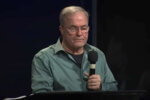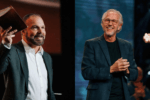9/11 gave the West a dark view of Islam, but YWAM’s Lynn Green says reconciliation is critical to the future
Church and mission leaders in the West should trust in the power of reconciliation rather than confrontation to bring understanding between Western Christians and Muslims, said Youth With A Mission International Director Lynn Green at a caucus of Christian and Muslim leaders held recently in the Middle East.
Green also called on Western Christians to refrain from “collectively demonizing” Muslims, while challenging caucus attendees to believe that now is God’s perfect timing for progress in the pursuit of peace between Christians, Jews and Muslims.
The assembly–held in Beirut, Lebanon, and Damascus, Syria, in April–convened Christians from the United States, Europe and the Middle East with Muslims from the Middle East. They discussed, among other things, the gap between Western believers and Muslims, which has widened considerably since the terrorist attacks of Sept. 11, 2001.
Green said he called the meeting primarily as a way “to re-establish a personal contact with friends we made during the Reconciliation Walk.”
In his other role as international director of the Reconciliation Walk initiative, Green has been a major campaigner for good will between Christians, Jews and Muslims.
“After what has happened, we believe more than ever in the necessity of a relational approach to both conflict resolution and evangelism,” Green told Charisma.
Matthew Hand, Middle East field director of the Reconciliation Walk, described the gathering as “an act of humility” for Christians, affording them an opportunity “to take our questions concerning Islam directly to Muslims.”
“Since Sept. 11 there has been much discussion about Islam, but only among ourselves,” Hand said. “Would we want Muslims to go primarily to Muslim scholars with their questions about the Christian faith?”
From 1996-1999 the Reconciliation Walk resulted in thousands of face-to-face encounters between Muslims, Jews and Christians of the Middle East and Christians from Western nations.
Western Christians retraced the path of the First Crusade through Turkey, Syria, Lebanon and Israel while offering an apology for the atrocities committed by the medieval Crusaders in the name of the church 900 years ago. They hoped to “represent the true gospel” in the Middle East, where it is still common to equate Christianity with the political and military ambitions of the United States and Europe.
Green told Charisma in 1998 that many Americans and Europeans, including charismatic and evangelical Christians, “perpetuate the resentments held against Christianity [in the Middle East] by…dealing with Middle Easterners as if they were all hostile and dangerous and potential terrorists.”
He re-emphasized that point in Beirut and Damascus, saying church leaders in particular must take care not to reinforce such stereotypes again. The church cannot hope to touch the millions of Muslims with Christ’s command to forgive and love your enemy “by trying to convince them that they are all demonized by their religion,” he said. “I do not think that is the way to win people.”
Instead, the Christian world should observe Jesus’ admonition to “see first the log in your own eye”–in spite of the polarization that has occurred since Sept. 11, Green said.
“Focusing on the evil of the other while neglecting your own historical and contemporary spiritual blindness is not very humble, is it?” he asked, while referring to historical examples of governments and organizations claiming biblical support for unjust or even terroristic violence, such as the Crusades, the Inquisition, apartheid, slavery or white supremacy in America.
Citing a near “inoculation within Islam against believing that Jesus died on the cross and rose again,” Green said the same belief exists in millions of people in “the so-called Christian West.”
“Is the anti-Christian spirit at work in parts of the Muslim world stronger than the anti-Christian spirit of Western materialism? I personally do not think so,” he said.
The Beirut-Damascus symposium “meant especially much to the local evangelical participants,” Green concluded. Noting that Middle Eastern Christians are virtually nonexistent in the public arena, he pointed out that “they dared to give a public presentation and were interviewed on Muslim television, which was a huge step for them.”
“In private, the feedback was very positive,” Green said. “I believe there will be more fruitful initiatives in the future.”
Tomas Dixon






Leave a Comment
You must be logged in to post a comment.